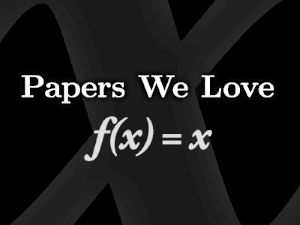Papers we Scrutinize: How to critically read papers
As someone who enjoys being at the intersection of the academic world and the world of industry, I'm very happy to see any attempts at bridging this harmful gap. For this reason, it is great to see that more people are interested in reading academic papers and that initiatives like Papers We Love are there to help.

There is one caveat with academic papers though. It is very easy to see academic papers as containing eternal and unquestionable truths, rather than as something that the reader should actively interact with. I recently remarked about this saying that "reading papers" is too passive. I also mentioned one way of doing more than just "reading", which is to write "critical reviews" – something that we recently tried to do at the Salon des Refusés workshop. In this post, I would like to expand my remark.
First of all, it is very easy to miss the context in which papers are written. The life of an academic paper is not complete after it is published. Instead, it continues living its own life – people refer to it in various contexts, give different meanings to entities that appear in the paper and may "love" different parts of the paper than the author. This also means that there are different ways of reading papers. You can try to reconstruct the original historical context, read it according to the current main-stream interpretation or see it as an inspiration for your own ideas.
I suspect that many people, both in academia and outside, read papers without worrying about how they are reading them. You can certainly "do science" or "read papers" without reflecting on the process. That said, I think the philosophical reflection is important if we do not want to get stuck in local maxima.
Published: Wednesday, 12 April 2017, 3:05 PM
Tags:
academic, programming languages, philosophy
Read the complete article